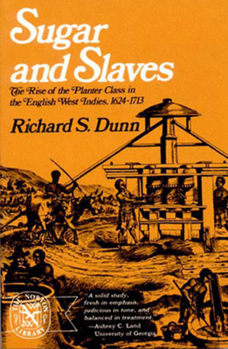Sugar and Slaves: The Rise of the Planter Class in the English West Indies, 1624-1713
Select Format
Select Condition 
Book Overview
First published by UNC Press in 1972, "Sugar and Slaves" presents a vivid portrait of English life in the Caribbean more than three centuries ago. Using a host of contemporary primary sources, Richard Dunn traces the development of plantation slave society in the region. He examines sugar production techniques, the vicious character of the slave trade, the problems of adapting English ways to the tropics, and the appalling mortality rates for both blacks and whites that made these colonies the richest, but in human terms the least successful, in English America.
Format:Paperback
Language:English
ISBN:0393006921
ISBN13:9780393006926
Release Date:January 1973
Publisher:W. W. Norton & Company
Length:359 Pages
Weight:0.78 lbs.
Dimensions:0.8" x 5.1" x 7.7"
Customer Reviews
3 ratings
Excellent Research
Published by Thriftbooks.com User , 19 years ago
Dunn does an excellent job of explaining the planter class in the West Indies. His research is excellent and his writing style is clear and devoid of that crazy academic jargon so often found in history books. This is my first book on planters and it gave me a good fund of knowledge on the histories of Barbados, the Leeward Islands, and Jamaica, and it outlined in detail how the planters made or lost money. For me, it's Dunn's careful unraveling of the planters' financial arrangements and entanglements that made this book absolutely hard to put down!
the brutality of the West Indies slave trade
Published by Thriftbooks.com User , 22 years ago
In "Sugar and Slaves," Richard Dunn shows not only the brutality of the West Indies slave trade that revolved around sugar, but also how slave owners "created a society...radically different from the one they left at home." He notes that while these planters brought with them to the islands their laws, church and social institutions, these settlers early on "developed their own lifestyle...bent by their eager embrace of African slavery." (46) Dunn persuasively argues that European planters who came to the West Indies traveled literally and figuratively "beyond the line" of normal, British social conventions, and created a world in which "everything goes," particularly the exploitation of slaves and natives in the creation of a dominant master class. These rapacious men, he argues, quickly adapted to harsh climatic conditions by abandoning the use of lower class but white indentured servants in favor of exploitable, controllable Negroes once the sugar boom created a demand. "The rape's progress was fatally easy," Dunn notes: "from exploiting the English poor to abusing colonial bondservants to ensnaring kidnaps and convicts to enslaving black Africans." (73) Unlike his Chesapeake or Lowcountry counterpart, the West Indies sugar lord produced nothing but his staple crop, and relied instead on imports for all other necessities. "In short, the English sugar planter was more strictly a businessman than the senhor de engenho of Brazil." (65) This was a marked difference from other English settlement and colonization patterns, which Dunn concludes is evidence of the atypical class of planter the Caribbean islands fashioned.
Thorough and Readable Study of Plantation Development
Published by Thriftbooks.com User , 24 years ago
Richard S. Dunn examines the British colonialization of the West Indies. Dunn considers numerous colonies, but Barbados takes early preeminence. Dunn discusses the adventurers of the first twenty years, mostly small-scale farmers; the cavalier-planters of the 1640s and '50s, Royalist exiles who fled the English Civil War; and the slaves who became a majority of the population in the period Dunn considers. Dunn offers a detailed contrast between the lives of the planter elite and the enslaved majority. This is a landmark work in the history of plantation agriculture in the West Indies. The work should also interest readers of Southern history. Dunn compares the rise of a cavalier elite in Barbados to the same development in Virginia. Planters from the West Indies, especially Barbados, dominated the early years of the colony of (South) Carolina. Other works on this period of West Indian history are Richard Sheridan's Sugar and Slavery and Gary Puckrein's Little England. Works by Hilary Beckles examine the lives of women and Blacks in this period of West Indian history.





